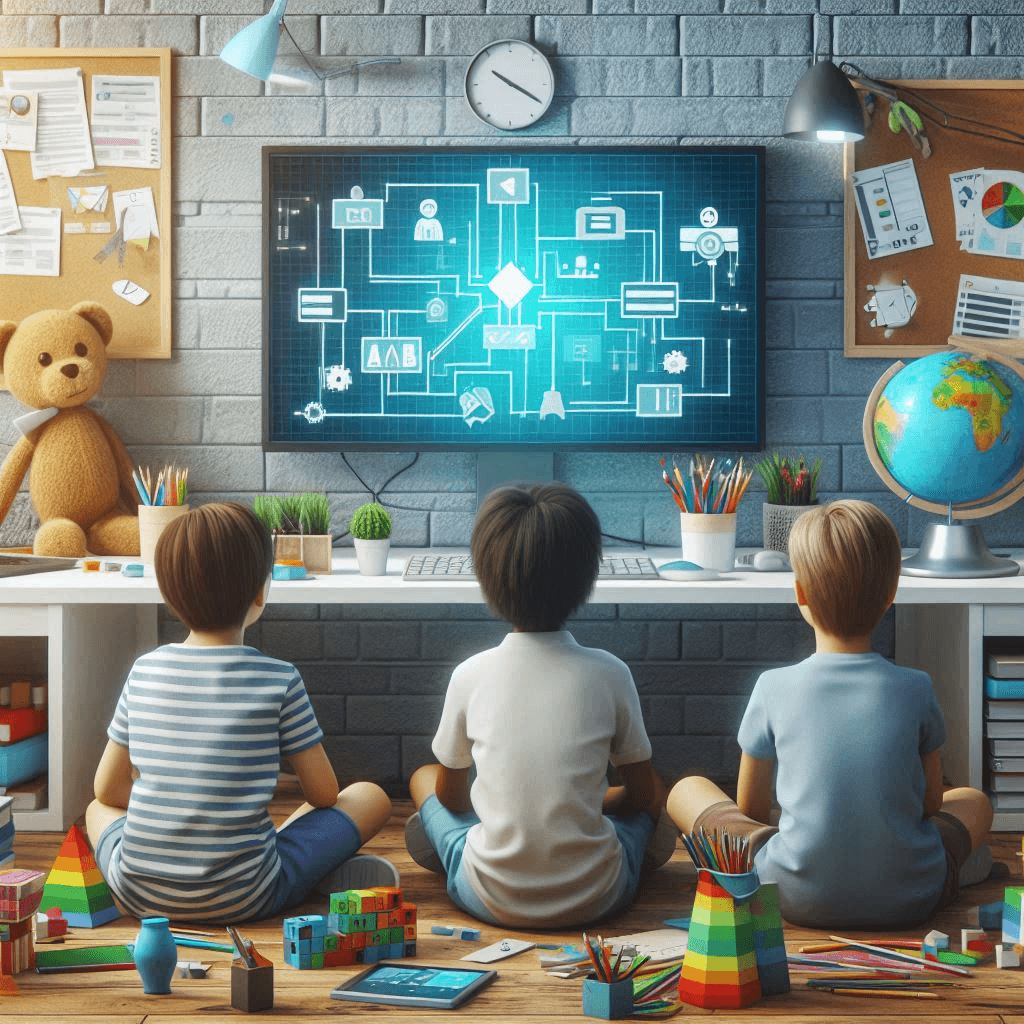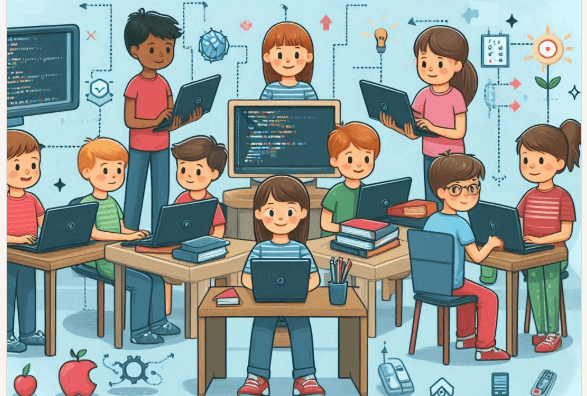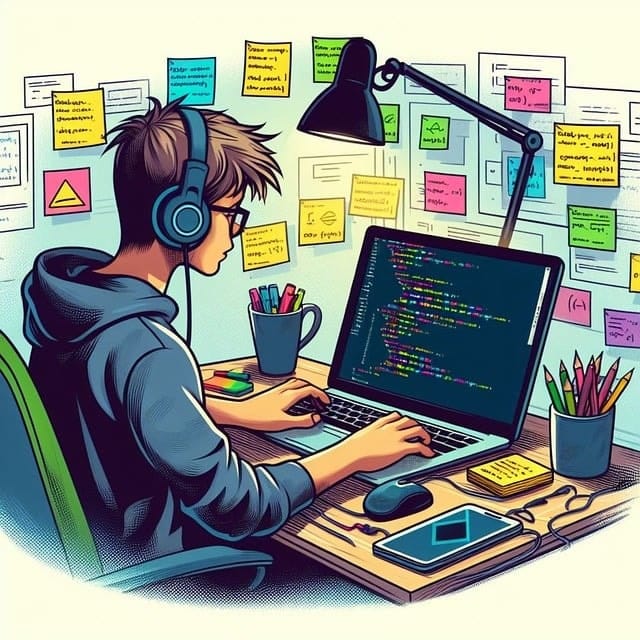5 Ways Coding Develops Critical Thinking Skills in Children
5 Ways Coding Develops Critical Thinking Skills in Children
Coding is more than a skill. It helps improve critical thinking and can influence how people think. Programming helps children learn reasoning, problem-solving, and creativity. When they write code, they break complex problems into simpler parts. They also spot patterns in these parts and make the necessary choices. This creates a solid foundation for later use in the job or in everyday life.

Encourages Logical Reasoning and Sequencing
Structured thought is what coding is all about. It breaks down problems that have to be solved, organizes codes into interrelated thoughts, and introduces sequences. This builds logical reasoning skills while learning how to solve problems step by step. Moreover, induction is important because they are programming languages that tend to identify patterns, develop ideas, and hone inductive reasoning. Understanding how developers think and write complex code strengthens structured thinking and has firm foundations that follow critical thinking and problem-solving.

For instance, if children learn the basics of program creation, they will need to organize commands, shaping their coding thoughts. When something goes wrong, they have to debug their code to find out what's wrong. This trial-and-error method leads them to think of different potential situations and make the right decisions. Allow them to learn using conditional statements that would enable them to rethink every scenario multiple times before they decide on predicting an outcome. This process improves analytical skills.

Become great thinkers who guide soft programming in logical resolution. In the preliminary stage, they practice solving problems and improving their judgment as they learn. Coding is a form of creative work, involving very much logic-based creativity and systematic methodology for problem-solving. Learning to code early helps kids gain useful life skills. This skill will benefit them later, whether they become software developers or need critical thinking skills.
Promotes Problem Decomposition
Breaks down big, complex problems into small steps. This helps develop logical reasoning skills. It is supposed to help them break open a challenge by focusing on treating elements as individual cases. That's how real programmers approach coding: they take a big idea, frame it with well-organized data, and then build it. The most interesting thing about this is that it applies not only to programming but also sharpens their mind for making better decisions in real life.

Through coding, kids learn to try different scenarios, test solutions, and refine their thinking logic. They would need to execute that for a game or a program to make decisions on how to structure each step. Using a programming language involves learning about analyzing data, using an if-then statement, and general optimizing. This teaches problem-solving skills, especially for complex tasks.Every software engineer must master this new skill.

Fosters Pattern Recognition
Patterns often recur in coding. This helps children see patterns. Then, they can improve their reasoning and analytical skills. Writing a program helps them see the similarities in syntax and logic. This experience speeds up their thinking when solving puzzles and making decisions. Good programmers learn patterns in coding. These patterns help them spot trends in math and science and recognizing these techniques is very important.

When kids start learning to write, they immediately understand how to use the previous thoughts in coding into new challenges. They are using logical structures. This helps them improve their inductive reasoning and draw conclusions. The logic-based creativity is shown in their optimization of coding strategy to discover the most efficient way to tackle problems. Coding teaches kids logical reasoning. This helps them get ready for exciting chances to innovate and solve problems in the future.
Cultivates Abstract Thinking
Coding sparks children's minds and opens new possibilities. It teaches abstract skills like algorithm building and data structures. These skills enhance logical reasoning. When kids write code, they don’t just follow steps,they learn to break problems into logical parts.
A software engineer debugs code and uses logical reasoning to create efficient solutions. Coding provides contexts where children can be creative with logic. They solve real problems, which helps them develop logical reasoning and make smart choices.
Coding encourages children to think critically about potential solutions and express their ideas. Testing and improving based on results helps them analyze situations. Abstraction helps in decision-making by predicting outcomes and making adjustments as necessary, strengthening their ability to develop logical thinking skills.

Develops Persistence in Problem-Solving
Teaching kids about mistakes in learning is key in coding. Programming, like many activities, brings many bugs and errors. Debugging code requires logical reasoning skills and persistence. The best programmers don’t quit,they analyze issues and find solutions.
Programming is both creative and challenging. Good programmers know that determination helps them succeed. Whether solving puzzles, writing scripts, or building programs, persistence is vital for problem-solving.
Through coding, children enhance critical thinking. They learn to break problems into smaller steps. They make guesses about errors, try different solutions, and make proper decisions.

Examples of Persistence in Coding in Real Life
Debugging a Broken Website
The web developer finds some page is not loading as expected. Instead of giving up, he analyzes the problem, checks the data, and attempts one solution after another until he finally fixes the issue. These experiences help develop logical reasoningskills and strengthen problem-solving skills. They teach programmers to break down complex issues into smaller, manageable parts.
Puzzles in Game Development
Game developers are constantly engaged in solving puzzles to ensure the smooth running of their games. From designing card games to interactive experiences, the developers use logical and inductuctive reasoning while working to create compelling experiences for users.
Why Good Programmers Never Give Up
A good programmer understands that every error is a step in learning. Each mistake provides another chance to enhance her logical thinking and refine coding thoughts. Just like solving a riddle or playing card games, great code means lots of patience, questioning, analyzing, and improving.

Conclusion
Coding is a wonderful tool for honing reasoning skills in children. This activity helps young people build a strong base in programming and decision-making skills. It also teaches them logic and develops logical reasoning skills and problem-solving, which they will use in real life.
Through coding, children learn to face challenges. They build resilience and improve their reasoning skills. Whether they want to be software engineers or just explore something new, coding offers a valuable way to practice critical thinking. As Cory House said, "Good programmers write code, but great programmers solve problems".
Coding Thoughts - FAQs
How developers think and write complex code?
Developers use coding thoughts and logical reasoning skills to break down complex problems. They rely on analytical skills to create efficient solutions. Good programmers follow a structured process. This process includes planning, debugging, and refining their code.As John Johnson wisely stated, "First, solve the problem. Then, write the code". Software engineers also use inductive reasoning to predict outcomes. This helps them make effective decisions while coding.
Can coding help kids develop logical reasoning at an early age?
Yes, coding helps kids develop logical reasoningskills at an early age. It teaches them how to write code, understand conditional statements, and recognize patterns in data. By solving coding challenges, kids learn how to decide, assume, and test different solutions, improving their problem-solving skills.Coding further gives rise to creativity based on logic, making it an ideal platform for building strong foundations in structured thought.

What are some fun ways to develop logical thinking skills through coding?
Interactive projects, coding games, and puzzle-solving significantly improve logical reasoning skills. Kids can play card games that involve programming logic, or they can free-code to create simple animations or apps. "Make it work, make it right, make it fast" said Kent Beck. This highlights how important practice is for improving skills.
Coding projects would definitely enable programmers to solidify coding practices while exercising wise decisions. Cory House's well-known quote states, Good programmers just don't code, they solve problems.
How does debugging code help develop logical reasoning in children?
Debugging helps children build logical reasoning skills. They learn to analyze mistakes and test solutions. This process boosts their critical thinking. They identify errors, refine their coding thoughts, and enhance their problem-solving strategies.
By making assumptions, testing outcomes, and correcting mistakes, kids practice structured thinking. This is similar to asoftware engineer working with a programming language.As Sam Redwine humorously said, "If debugging is the process of removing bugs, then programming must be the process of putting them in."

How does coding challenge children to think abstractly and develop critical thinking?
Coding teaches children to create solutions that translate abstract ideas into structured code. Gradually, they will start to understand very complex objects, develop logical reasoning, and develop algorithms, and make decisions. This enhances their logical thinking and logic-based creativity, a requirement to deal with a problem. Programming also enhances their ability to communicate ideas clearly and to think strategically like the best programmers.
Comments
Your comment has been submitted